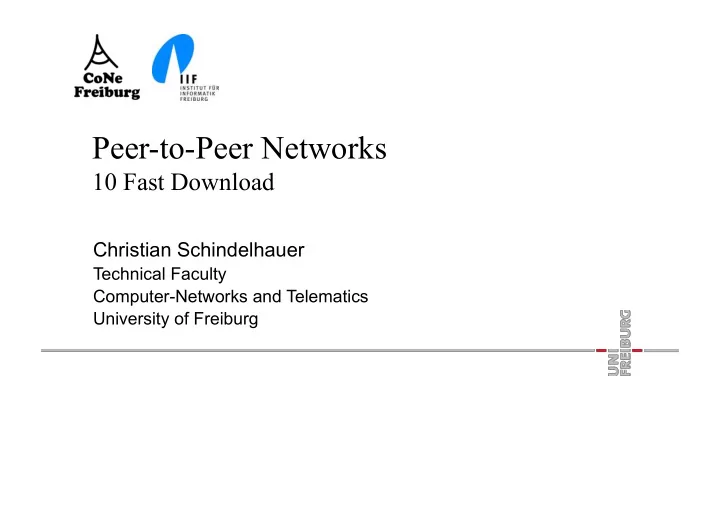

Peer-to-Peer Networks 10 Fast Download Christian Schindelhauer Technical Faculty Computer-Networks and Telematics University of Freiburg
IP Multicast � Motivation - Transmission of a data stream to many receivers � Unicast - For each stream message have to be sent separately - Bottleneck at sender � Multicast - Stream multiplies messages www.netcraftsmen.net/.../ papers/multicast01.html - No bottleneck Peter J. Welcher 3
Working Principle ‣ IPv4 Multicast Addresses • class D - outside of CIDR (Classless Interdomain Routing) • 224.0.0.0 - 239.255.255.255 ‣ Hosts register via IGMP at this address • IGMP = Internet Group Management Protocol • After registration the multicast tree is updated ‣ Source sends to multicast address • Routers duplicate messages • and distribute them into sub-trees ‣ All registered hosts receive these messages • ends after Time-Out • or when they unsubscribe ‣ Problems • No TCP only UDP • Many routers do not deliver multicast messages - solution: tunnels 4
Routing Protocols � Distance Vector Multicast Routing Protocol (DVMRP) - used for years in MBONE - particularly in Freiburg - own routing tables for multicast � Protocol Independent Multicast (PIM) - in Sparse Mode (PIM-SM) - current (de facto) standard - prunes multicast tree - uses Unicast routing tables - is more independent from the routers � Prerequisites of PIM-SM: - needs Rendezvous-Point (RP) in one hop distance - RP must provide PIM-SM - or tunneling to a proxy in the vicinity of the RP 7
PIM-SM Tree Construction ‣ Host A Shortest-Path-Tree ‣ Shared Distribution Tree From Cisco: http://www.cisco.com/en/US/ products/hw/switches/ps646/ products_configuration_guide_chapter09186a008 014f350.html 9
IP Multicast Seldomly Available ‣ IP Multicast is the fastest download method ‣ Yet, not many routers support IP multicast – http://www.multicasttech.com/status/ 11
Why so few Multicast Routers? ‣ Despite successful use • in video transmission of IETF-meetings • MBONE (Multicast Backbone) ‣ Only few ISPs provide IP Multicast ‣ Additional maintenance • di ffi cult to configure • competing protocols ‣ Enabling of Denial-of-Service-Attacks • Implications larger than for Unicast ‣ Transport protocol • only UDP - Unreliable • Forward error correction necessary - or proprietary protocols at the routers (z.B. CISCO) ‣ Market situation • consumers seldomly ask for multicast - prefer P2P networks • because of a few number of files and small number of interested parties the multicast is not desirable (for the ISP) - small number of addresses 12
Recommend
More recommend